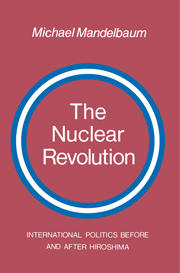Book contents
- Frontmatter
- Contents
- Preface
- 1 The nuclear revolution
- 2 Nuclear weapons and chemical and biological weapons
- 3 The balance of power in the nuclear age
- 4 Arms competition: The nuclear arms race and the Anglo–German naval rivalry
- 5 Arms competition: The nuclear arms race and tariff competitions
- 6 NATO: The nuclear alliance
- 7 The nuclear presidency
- 8 The bomb, dread, and eternity
- Notes
- Index
4 - Arms competition: The nuclear arms race and the Anglo–German naval rivalry
Published online by Cambridge University Press: 26 January 2010
- Frontmatter
- Contents
- Preface
- 1 The nuclear revolution
- 2 Nuclear weapons and chemical and biological weapons
- 3 The balance of power in the nuclear age
- 4 Arms competition: The nuclear arms race and the Anglo–German naval rivalry
- 5 Arms competition: The nuclear arms race and tariff competitions
- 6 NATO: The nuclear alliance
- 7 The nuclear presidency
- 8 The bomb, dread, and eternity
- Notes
- Index
Summary
Three arms races
Thucydides records that when the Spartans and their allies resolved to go to war they decided to assemble a fleet of ships to rival the navy of the Athenians, the masters of naval warfare in ancient Greece. Building armaments is a logical, indeed the logical, way to prepare for war. It is logical even in peacetime. The logic stems from the character of the international system. Because it makes war possible, anarchy produces insecurity, which places a premium on military strength. States have sometimes tried to protect themselves by changing the system – either radically, through disarmament, or in more modest fashion, through the establishment of a balance of power. Short of the first, and even in the event of the second, they have invariably found it advisable to provide themselves with other forms of protection. There is a story about a visitor to Israel who asks an Israeli why so many of the people of the Bible, which preaches peace and tranquility, go about carrying guns. “It is true that the Bible says that on the day of days the lion shall lie down with the lamb,” he is told. “But it isn't the day of days yet. And even then, I'd rather be the lion than the lamb.”
Most states have preferred to be lions. They can draw strength from external sources, by forming alliances with others, or they can use their own resources to build up their military might.
- Type
- Chapter
- Information
- The Nuclear RevolutionInternational politics Before and after Hiroshima, pp. 87 - 116Publisher: Cambridge University PressPrint publication year: 1981



